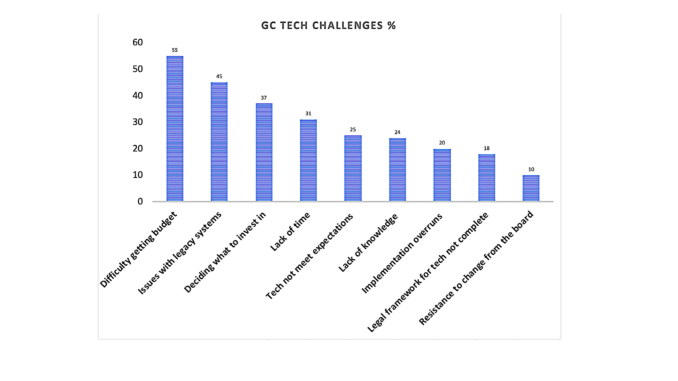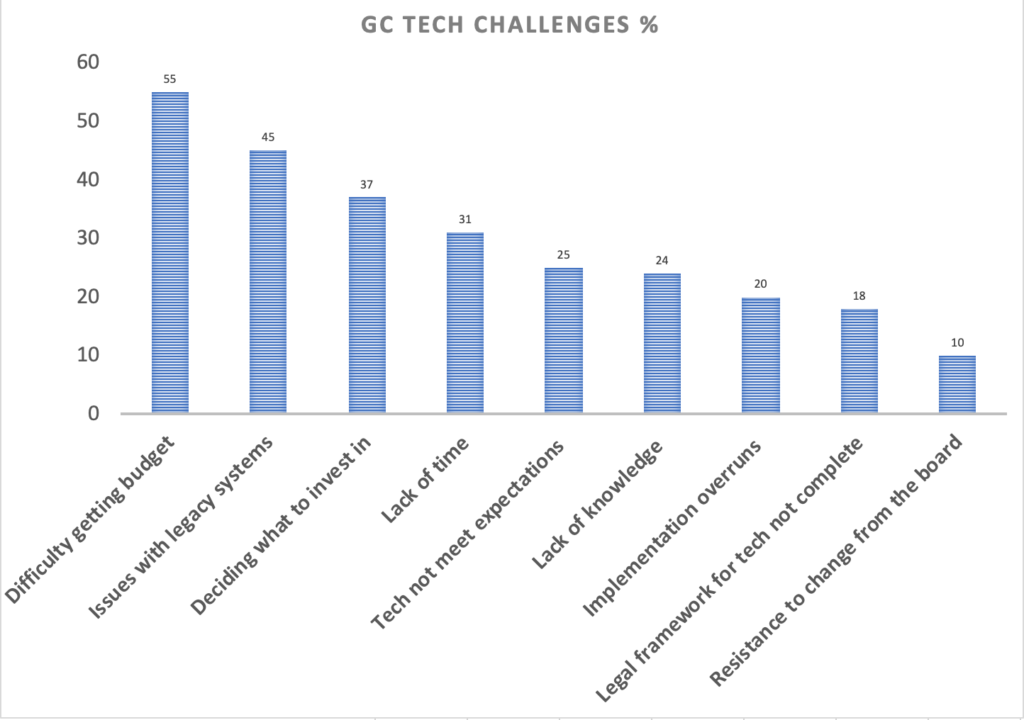
A report by global legal services business, Clyde & Co, has found that the number one reason GCs struggle with legal tech adoption and implementation is ‘difficulty in getting budget‘, with 55% of the inhouse lawyers surveyed saying this was the main challenge.
However, one of the least significant reasons was ‘resistance to change from the board’ at just 10%.
At first glance this seems to be a paradox, i.e. budget – which comes from the board/C-suite/CFO is the main challenge, but the data also says that most boards are not actively blocking anything.
What does this mean? To Artificial Lawyer this suggests that the real problem is not that getting the money is impossible, but making the case for the getting the money is hard. That is to say, companies probably have the money, they just need a good reason to give it to you.

I.e. a GC may struggle to get new funds to spend on legal tech if they just want ‘to do something with AI’, but if they can build a solid business case, tap existing data and show it in a meaningful way, and create models for how this new tech would be of benefit to the company as a whole, then AL is sure that there would not be such a problem. As, after all, only 10% said that the board was actively blocking initiatives in the legal department.
Or, another way of looking at this is to say that inhouse legal teams all have budgets and those budgets often have hard limits on what can be spent on tech and internal resources. But, most internal legal teams have a lot of leeway when it comes to things like event driven legal spending on outside counsel.
The job now requires GCs to be able to make the same solid arguments on legal tech spending as they might when instructing a major law firm to help with a significant legal matter, with the CFO no doubt not being as concerned when they see how that spending benefits/protects the company.
The challenge is really – it would seem – not that large corporates don’t have $70,000 spare to pay for an AI review system licence, but rather that the GC may not be able to articulate the benefits to the CFO in a way that triggers the ‘opening of the wallet’. And, of course, why should they? GCs for many decades have not been focused on developing business cases for the use of strategic technology. That has not been in their already highly complex and demanding job description.
But, perhaps that will now have to become part of the skill set…?
The second main challenge was issues with legacy systems, which sounds like a very practical barrier – and not something that perhaps gets flagged up enough.
Deciding what to invest in, a lack of time and a lack of knowledge were also reasons given for not moving forward with legal tech. They all point to a reality that everyone can see: inhouse legal teams are generally not equipped for complex technology procurement processes.
Unless they have a sizeable legal ops team, they almost certainly will need to rely on some sort of external input, whether that’s from a law firm, or consultants.
 Also, 25% said that tech not meeting expectations was a reason for legal tech projects not happening successfully. This could perhaps be because of vendors over-selling, or simply that the application could not meet the specific needs of the GC.
Also, 25% said that tech not meeting expectations was a reason for legal tech projects not happening successfully. This could perhaps be because of vendors over-selling, or simply that the application could not meet the specific needs of the GC.
Commenting on the findings, Lee Bacon, Partner at Clyde & Co, said: ‘To maximise returns from investment in new technology, amid limited budget, a balance needs to be struck between identifying tools which will assist in establishing a coherent strategic vision, and more pragmatic tools relevant to the day-to-day demands of the business. A good understanding of the legal technology market will assist both.’
The report was produced in association with Winmark. The full report, which covers a very wide range of inhouse issues beyond tech, can be found here.
Discover more from Artificial Lawyer
Subscribe to get the latest posts sent to your email.
Good Share, we have written a piece which shares similar views on adoption and barriers to Legal Tech https://www.practiceleague.com/insights-for-general-counsel.html. If Budget is the primary reason it also means that largely people are aware of such technologies and platforms. It also means that it is not just the Legal who need to understand the value of Legal Technology but also the Management and its Board.
Richard this is a good proof of the age-old equation where Value (ie invest) = Benefits to be derived (ie quantified better, faster or cheaper) – Cost. Cost (ie budget invested now) is measured in $ or £ whereas Benefits are mostly general statements about some, often indeterminate, period day in the future. Further, legal budget is seen as a cost centre, a lesser form of life than revenue centres.